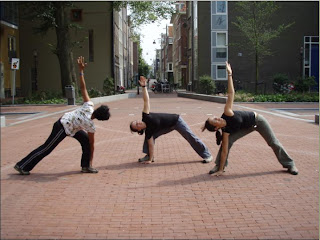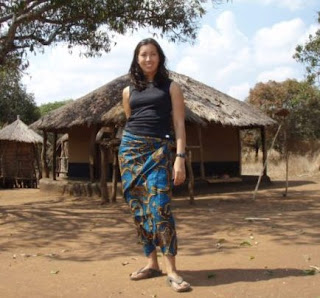The power just went out.
I write this, my first official blog entry from Malawi, on my bunk at the hostel I’m currently staying at. The power typically goes out once or twice a day for a couple hours, generally at particularly inconvenient times, such as the early evening. The door has been left ajar to provide some dim light for my two British dorm-mates to pack in. Insects of various sorts dart back and forth at my computer screen, attracted by the light.
Heather and I have finally arrived in Lilongwe. The trek in from Lusaka is not a straightforward one. The journey takes anywhere from 12 – 16 hours, and involves a bus, 2 taxis, and a minibus.
We left our Lusaka hostel at 5:30 am and made our way to the nearby bus terminal. As we emerged from our cab we were faced by a chaotic scene with men trying to bring us to the buses they were recruiting for, our desired destination a seemingly unimportant detail. We managed to find Dave who directed us to our desired coach bus and got the tickets.
The first part of the journey was an 8 hour bus ride – assuming no breakdowns of course. I had been feeling a little off, health wise (nothing serious!), for the previous couple of days. While I wasn’t bad off, an 8-hour bus ride when feeling queasy and generally ill is not an appealing concept. I started feeling worse and worse, and spent the first few hours of the trip feeling like death. At about the 5-hour mark, I miraculously started feeling a-okay, making the rest of the trip pretty bearable.
Our final destination of the coach ride was Chipata. When we got off we were confronted with another slightly chaotic scene, this time a bus stop filled with men offering currency exchange services and taxi rides. We hoped on a shared taxi to the Malawi/Zambia border. We squeezed 6 people, plus the driver in the taxi, and Dave, Heather and I all had our sizable daypacks on our laps. It was cozy.
We passed through immigration in Zambia and customs in Malawi with no problems. Finally, at long last, Heather and I had arrived in our home for the next year. I whispered to her excitedly: “Guess what! We’re in Malawi!” and skipped a few steps happily. Unfortunately, my first moments in Malawi didn’t go as smoothly as one would hope.
Finally having arrived in Malawi, it was now time for another shared cab ride. As we approached the cab, I noticed how full the trunk already was. I voiced my concerns about our stuff fitting in there, but Dave assured me “they always find a way.”
As the cab driver strapped the bags in, I remained sceptical about my bag actually making it through the 15 minute journey. Nevertheless, we squeezed into the overfilled taxi, and as I sat uncomfortably with Heather and my daypack sharing my lap, I soon forgot about the state of peril I left my pack in.
When we arrived at the border town, I hopped out and checked the trunk.
Dave’s pack? Check.
Heather’s pack? Check.
My pack? Oh, dear . . .
My mind started to race: WHERE IS MY BAG??? I looked around frantically to see if it had been set aside anywhere. I tried to remain calm. I announced that “My bag is gone!” and someone calmly replied that it had simply fallen out and that the cab driver was about to return to get it. Leaving our stuff with Heather, Dave and I hopped in the cab to speed back in an effort to find my pack.
I remained calmer about the situation than I would have expected. I reasoned to myself that anything I really needed was in my daypack anyway . . . right?
We sped back to the border, the cab driver occasionally pulling over to ask pedestrians if they’d seen the bag. No one had. Dave tried to be reassuring and said that someone probably found it and was just waiting for someone to return to fetch it. We had nearly returned to the border when a couple guys on a bicycle started wildly waving us down – I turned back and saw the guy on the back of the bicycle had my pack on his shoulders – I could practically hear angels singing. We gave them some kwatcha (the local currency) for their help, and sped back to rejoin Heather.
My pack is now looking a little worse for wear – I guess that’s what happens when a pack gets ejected from taxicab at what must have been 70+ kph. All in all though, it held up reasonably well. There are several tears and rips, one of the handles is nearly falling off, and a clip broke. I’ll bring it to a tailor in town to get patched up and it’ll be as good as new. I was worried about the contents, imagining that I’d open it up to find exploded containers of sunblock and shattered bottles on bug spray. At the hostel I did a thorough investigation, and the only fatality I’ve identified is my soap dish.
Back in town, we ended up in a bit of an argument with our taxi driver. He did not seem to agree that we shouldn’t have to pay him for his services, due to the damage caused to my bag as a result of his shoddy strapping. Dave did all the talking. A bit of a crowd developed, and I was feeling a tad uncomfortable, though I wasn’t sure what side they were on. When the guy started insisting that we deal with this at the police station, Dave gave in and gave him a portion of the fare.
Next stage of the journey was minibus. To clarify, minibuses are basically large vans with bench seats into which as many people as can possibly fit (the Canadian and Malawian perceptions of “fitting” are dramatically different) are squeezed. In Malawi, these are used both within cities and for intercity travel. There are no schedules; the busses simply leave when they are full – extremely full.
I don’t now how many people were in the minibus we took to Lilongwe, though in hindsight I should have counted. Suffice it to say, there were more people in that thing than I would have thought physically possible. I didn’t exactly have the most comfortable spot for the hour or so ride to Lilongwe. I sat on an unpadded fold down seat with no back. I had my heavy daypack on my lap, and the conductor practically sitting on that. There was a chicken by my feet, a baby pressed up against my back, and some kind of piping wedged against my leg. I could barely move my arms, and could not move my legs. I could only move my arms enough to prop myself up awkwardly to avoid sliding off the seat entirely (I was half hanging off of it as it was). While minibuses are not known to be the most comfortable mode of transport, I had a particularly unappealing seat.
It was around 6 in the evening by the time we reached Lilongwe, so we actually made reasonable time. We caught a cab to the hostel, which is just outside of town. I didn’t think the car was going to make it, I really thought it was going to rattle into pieces en route. When I opened the door upon arrival, the interior of it fell off with a thud. Oops!
At the hostel we were greeted by a few of the Junior Fellows (short term volunteers with EWB that go overseas for 4 months, typically during the summer months) who were staying there on a short term basis. We grabbed dinner (the first meal we’d had all day), chatted a bit, and then went to bed. It was an exhausting day.
My first full day in Lilongwe was spent exploring the city. Dave brought Heather and I for a tour of the rather small city. Exploring by foot, minibus, and taxi, we actually saw quite a large part of the city. I already feel more at ease here than I did in Lusaka. It has more of a small town feel, and the level of hustle and bustle is lower. We checked out the “old town” where my NGO is located, and where much of the shopping and market areas are found.
Next we headed into the city centre, which is a short minibus ride away. Between the old town and the city centre is a wildlife and nature reserve, which splits the city. The city centre is small, and where many office buildings are located. We had lunch at a great restaurant with a very attentive manager that assured us that his goal was to “exceed expectations,” and at the end of the meal came to check on us to check and make sure that our expectations had indeed been exceeded.
After lunch we grabbed a cab to Kawale, a residential area that Dave suggested would be one we might consider finding a place to live in. It was a nice area, with lots of kinds running around calling out to us “how are you? How are you?”
We visited the family a couple of past volunteers stayed at. We were welcomed in by the Gogos (grandparents) who welcomed us into their home, showed us photos, and talked our ears off. Dave later received a phone call from the grandpa who wanted to make sure that we knew we could stay there for free anytime we wanted to.
That pretty much sums up my Malawi experience up to this point. I’ll report back again soon!
Kim

























